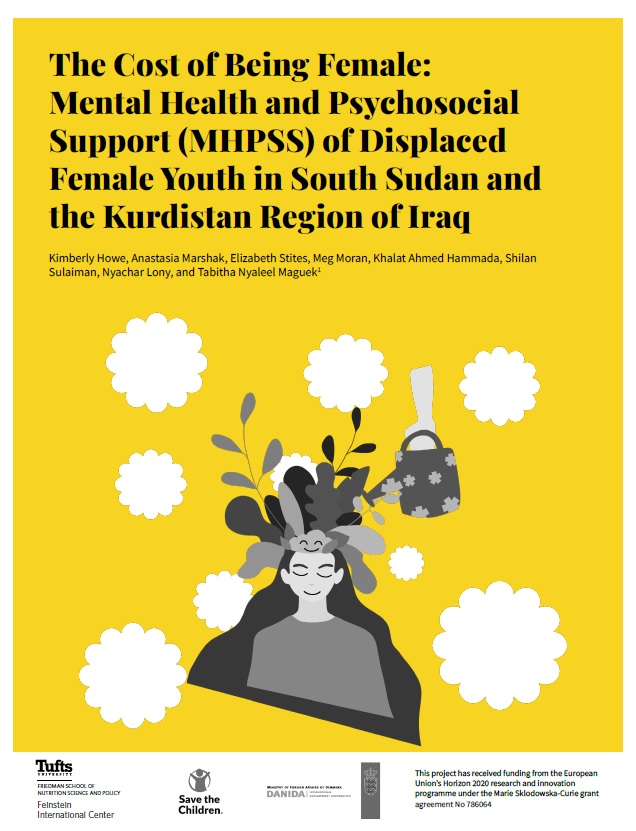In following the lives of displaced female youth in South Sudan and the Kurdistan Region of Iraq, the research team was struck by how central mental health—in particular poor mental health and psychosocial functioning (MHPSS)—was to the lives of the study participants. This briefing paper outlines the general situation of displaced female youth—unmarried, married, divorced, widowed—from a MHPSS lens. The study shows how female youth in displacement are negatively impacted by traumatic experiences coming from their families, communities, and as a result of war. It also provides evidence for the long-term negative impacts of being forcibly married, divorced, and widowed. However, some participants who married early, or had pregnancies out of wedlock described the positive impacts of these events.
The main findings of this study include:
- Female youth in the study, on average, experienced 14 types of traumatic events despite their young age. In both countries, the more traumatic events experienced, the lower their scores on a standardized resilience measure.
- Participants faced ongoing threats to their personal security, which negatively impacted their mental health and psychosocial functioning.
- MHPSS was poorer amongst adolescents who were forcibly married, as well as those that were divorced or widowed. Suicidal ideation and attempts were not uncommon.
- Female youth living with disabilities faced social exclusion, harassment, and difficulties accessing school. Most felt that they are a burden to their families.
- In both countries, female youth described that they derived strength and well-being from social connections, including friends, boyfriends, husbands, and members of their natal families and in-laws.
- Poor mental health and psychosocial functioning was found to stem from patriarchal norms and gender inequalities—dictating the types of abuse and deprivation female youth suffer, as well as the family, community, and legal responses to such abuses.
One in five girls is married under the age of 18 globally, and this practice likely increases during crises, including conflict, displacement, and COVID 19. While the negative repercussions on the child bride, her family, and eventual children are well-documented, little is known about the needs, challenges, opportunities, and constraints faced by female youth in displacement, including how early marriage transpires, and how lives unfold after marriage. As such, the Feinstein International Center together with Save the Children Denmark followed a cohort of displaced adolescent girls in South Sudan and the Kurdistan Region of Iraq (KRI) between the ages of 14 and 23 for 1.5 years using holistic, participatory methods.
The sample included internally displaced South Sudanese in South Sudan, and Syrian refugees and displaced Yazidis in the KRI. Research participants were unmarried, married (as minors), divorced, and widowed. Many girls in the cohort became pregnant as minors, and/or have physical, psychological, and intellectual disabilities.
The researchers conducted more than 600 interviews with more than 100 members of the cohort. This data will inform briefing papers on six topics:
- early pregnancy and sexual and reproductive health
- decision making around the practice of early marriage
- life after early marriage
- the special situation of divorced and widowed female youth
- mental health and psychological support, displacement, and early marriage
- education, displacement, and early marriage
Each paper provides cross-sectoral, concrete recommendations for humanitarian organizations seeking to prevent and respond to early marriage in fragile settings.
This project received support from Save the Children Denmark, DANIDA, Tufts University, and the European Union’s Horizon 2020 Research and Innovation Program under the Marie Sklodowska-Curie grant agreement No 786064.







